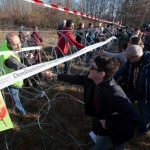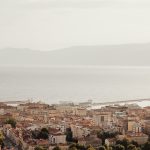About 150 migrants demanded to be allowed to enter Croatia.
According to Croatia’s Ministry of the Interior, the protest of about 150 migrants held on Tuesday on the Serbian-Croatian border was supposed to grow into a more massive gathering so that migrants could then cross the Croatian border, but the matter was resolved in cooperation with the Serbian police and the European Commission, reports N1 on December 27, 2017.
Interior Minister Davor Božinović said on Wednesday that the Croatian border police was well organised and familiar with those plans, adding that for several days there had been reports that such an event was being prepared. According to him, a group of about 150 migrants organised themselves on the Serbian side of the border, and according to the information available, the gathering was supposed to grow to approximately 2,000 people, when the migrants would attempt to cross the border.
The Minister said that the migrants were invited to come to the border through social networks and those efforts, according to the police data, included some of the non-governmental organisations in Serbia. However, the matter was resolved in contact with the Serbian police and the European Commission, the Minister said, adding that Serbian police officers last night dismantled a tent settlement that would be wholly removed today, while the migrants would be accommodated in centres throughout Serbia.
Commenting on the cooperation with the Serbian police, the Minister said that what happened yesterday, especially overnight, showed that the countries could cooperate if they wanted to. “The Serbian police probably came to the conclusion that this image was not good for Serbia because people wanted to enter an EU member state in an illegal manner. It was clear that the Croatian police, protecting its own territory and enforcing the laws of the Republic of Croatia but also EU legislation, would not allow that,” said Božinović.
He added that Croatia had the ambition to become a member of the Schengen Area and as such must implement the EU laws, in particular regarding the protection of external borders from illegal migration.
Although there are sometimes differing accounts in the media, it is not true that Croatia is not cooperating in the context of the migrant crisis, the Minister said, pointing out that in late November the first 40 Syrian refugees from Turkey came to the country. They will be integrated into Croatian society, and additional 50 refugees are expected early next year. Also, 77 migrants from Italy and Greece will also be coming.
However, Croatia is tasked with protecting the external borders in a way that prevents illegal migrations, which is a policy of the European Union, which would not provide funds to the border police if it wanted migrants to cross the border across fields and rivers instead of regular border crossings, he said.
The next year will be crucial for the completion of technical preparations for joining the Schengen Area, for which Croatia has received the support of the European Parliament, the Minister said, adding that the police were conducting a number of activities to strengthen state border controls.
Translated from N1.








